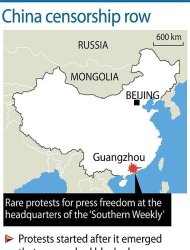China paper: regulation must 'keep pace
A Chinese newspaper at the centre of a dispute over
censorship said on Thursday that Communist regulation of the media must
"keep pace with the times", in its first edition since the row began.
"It's fundamental that the party regulates the press, but its method
of regulation needs to be advanced to keep pace with the times," the
Southern Weekly said in an editorial, without making direct reference to
the controversy.The row at the popular liberal paper, which had an article urging greater rights protection replaced with one praising the ruling party, has seen demonstrators mass outside its headquarters in the southern city of Guangzhou.
But the newspaper came out on Thursday as scheduled after reports of an agreement between staff and authorities that officials would no longer directly interfere in content before publication.
There was speculation that as part of the deal, Southern Weekly would not give its account of the controversy.
In the event the editorial on press freedom was printed in small text, as a commentary on another article on media management, reprinted from the People's Daily, the Communist Party's mouthpiece.
The Southern Weekly said that because of the rising popularity of the Internet, China needed an "updated method of managing public opinion", and called for "reasonable and constructive media" to be protected.
It used phrases commonly employed by China's Communist leadership and did not directly criticise the government's handling of the controversy, apparently as a cautious move.
"Chinese media can never be independent of the government... but the propaganda department should not censor in advance," said Min Jiang, a professor of journalism at Beijing Foreign Studies University.
The deal "seemed to mark progress" in marking out limits for government censorship, he added.
At their peak Monday the demonstrations, the first against press censorship in two decades, drew hundreds of people and the campaign was backed by the blogosphere and celebrities on Weibo, China's equivalent of Twitter.
Reports said that Hu Chunhua, the top Communist official in Guangdong province, where the newspaper is based, and a rising star in the party, had stepped in to mediate in the row.
There was no sign of protesters outside the newspaper's main office Thursday, but the newspaper was not available from news stands in Guangzhou during the morning, although vendors had it on sale in Beijing and Shanghai.
Thursday's edition led with a two-page investigation into a fire at an orphanage in central China's Henan province, and devoted pages three and four to a review of the most influential legal cases of 2012.
Southern Weekly's investigative reports have made it one of the biggest-selling papers in China, with a keen following among urban intellectuals, but also left it subject to periodic purges.
All Chinese media organisations receive instructions from government propaganda departments, which suppress news seen as "negative" by the Communist Party.
But the censorship of Southern Weekly was seen as unusually direct, although the original article soon emerged on Chinese social media.
Former journalists at the newspaper, as well as intellectuals and students published open letters calling for the resignation of Tuo Zhen, the propaganda official said to have been responsible.
The censorship controversy appeared to spread to Beijing, with the publisher of the Beijing News, known for its investigative reporting, threatening to resign, accounts posted online by newspaper staff said.
The publisher, Dai Zigeng resisted pressure from censors to reprint an editorial from the state-run Global Times newspaper, which was critical of the Southern Weekly.



ไม่มีความคิดเห็น:
แสดงความคิดเห็น